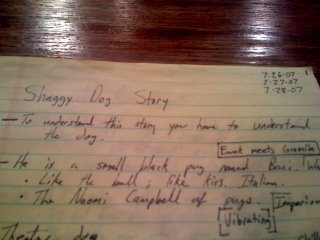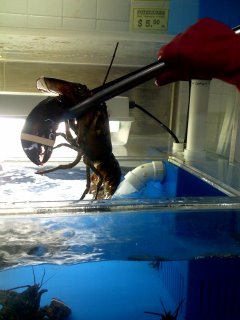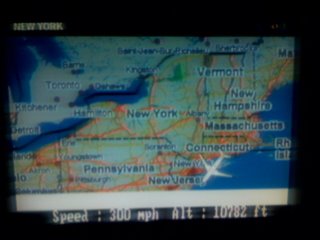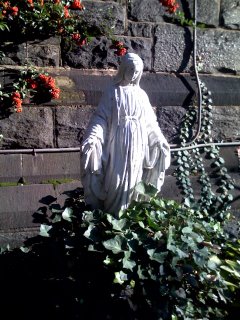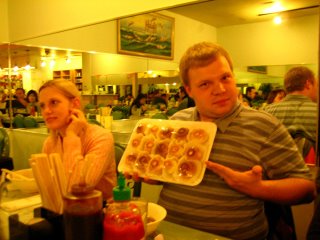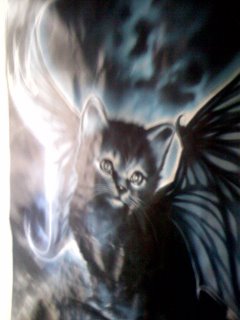Friday, November 30, 2007
Thursday, November 29, 2007

Headed up to Syracuse today for TONGUES WILL WAG at Redhouse--two shows this Friday and Saturday nights. If anyone has any advice about things to do in Syracuse--let me know. Tickets are sold out for one of the shows, but I believe there is a wait list, and full details are here.
Next week I'll be performing at Speakeasy Stories on Tuesday at the Cornelia Street Cafe, as will my director, wife and co-collaborator Jean-Michele Gregory. I don't know what story she's telling, but odds are our stories will contradict deliciously, and then there will be a knife fight. Joy! You can find out more here.
Finally, I'll be performing my first ever HOLIDAY SHOW this December at the Brooklyn Public Library as part of their performance series. It's called CHRISTMAS: FRIEND OR FOE? and happens on December 15th at 7pm. The library is describing the show in this way:
"Master storyteller Mike Daisey holds forth on the secret nature of gifting frenzies, flying fat men, and the collision of mania, decadence, and celebration that marks the end of every year."
I was drunk when I told them this, but I stand by it--I have great enthusiasm and respect for the idea of the holiday show, and every year there's a certain story I make a point of telling at a small venue around NYC concerning the holidays. This show will contain that story and tons more--I'm actually giddily excited about the entire enterprise. Tickets are cheap, and full details are available here, and the SmartTix link is here.
Wednesday, November 28, 2007
Daisey, Goddess, Orlandersmith, et al. Set for Under the Radar: Theater News on TheaterMania.com
Daisey, Goddess, Orlandersmith, et al. Set for Under the Radar: Theater News on TheaterMania.com:
Works by Mike Daisey, Rha Goddess, Young Jean Lee, and Dael Orlandersmith will be part of the Public Theater's Under the Radar 2008, to be held January 9-20.
This fourth annual event, curated by Mark Russell, will feature plays and performances from all around the world, including Daisey's How Theater Failed America, Goddess' Low: Meditations Trilogy Part I, Lee's Church, and Oerlandersmith's Stoop Stories.
Other artists who will be represented in the festival include the Belarus Free Theatre, Michael Melamed, Nature Theatre of Oklahoma, Mark O'Rowe, Jay Scheib and Leah Gelpe, The Suicide Kings, and Reggie Watts.
Works by Mike Daisey, Rha Goddess, Young Jean Lee, and Dael Orlandersmith will be part of the Public Theater's Under the Radar 2008, to be held January 9-20.
This fourth annual event, curated by Mark Russell, will feature plays and performances from all around the world, including Daisey's How Theater Failed America, Goddess' Low: Meditations Trilogy Part I, Lee's Church, and Oerlandersmith's Stoop Stories.
Other artists who will be represented in the festival include the Belarus Free Theatre, Michael Melamed, Nature Theatre of Oklahoma, Mark O'Rowe, Jay Scheib and Leah Gelpe, The Suicide Kings, and Reggie Watts.
Tuesday, November 27, 2007
LEGO LEGACY
LEGO LEGACY:
NOW that Norman Mailer has passed on, the big question is: Who gets his Legos? The incendiary novelist built a 15,000- piece "City of the Future" with two pals in his Brooklyn apartment - but where it will go next, nobody knows. Our source mused, "Imagine what a one-of-a-kind artistic creation by one of last century's most acclaimed literary figures would be worth at Sotheby's. But how would you get the damn thing out of his brownstone without breaking it up? You could reassemble it by hand, but that wouldn't be quite the same thing as something actually assembled by the master, would it?"
NOW that Norman Mailer has passed on, the big question is: Who gets his Legos? The incendiary novelist built a 15,000- piece "City of the Future" with two pals in his Brooklyn apartment - but where it will go next, nobody knows. Our source mused, "Imagine what a one-of-a-kind artistic creation by one of last century's most acclaimed literary figures would be worth at Sotheby's. But how would you get the damn thing out of his brownstone without breaking it up? You could reassemble it by hand, but that wouldn't be quite the same thing as something actually assembled by the master, would it?"
J.F.K.’s Death, Re-Framed - New York Times
J.F.K.’s Death, Re-Framed - New York Times:
And why has it taken so long to realize that the assassination and the Zapruder film are not one and the same? Part of the answer lies in the power of the film itself. As the critic Richard B. Woodward wrote in The Times in 2003, the assassination became “fused with one representation, so much so that Kennedy’s death is virtually unimaginable without Zapruder’s film.” To that, one has to add the element of distraction. The Warren Commission did not pursue its May 1964 insight because it was fixated not on the shot that missed but on the ones that killed the president.
If this belated revelation changes nothing from one perspective — Oswald still did it — it simultaneously changes everything, if only because it disrupts the state of mind of everyone who has ever been transfixed by the Zapruder film. The film, we realize, does not depict an assassination about to commence. It shows one that had already started.
And why has it taken so long to realize that the assassination and the Zapruder film are not one and the same? Part of the answer lies in the power of the film itself. As the critic Richard B. Woodward wrote in The Times in 2003, the assassination became “fused with one representation, so much so that Kennedy’s death is virtually unimaginable without Zapruder’s film.” To that, one has to add the element of distraction. The Warren Commission did not pursue its May 1964 insight because it was fixated not on the shot that missed but on the ones that killed the president.
If this belated revelation changes nothing from one perspective — Oswald still did it — it simultaneously changes everything, if only because it disrupts the state of mind of everyone who has ever been transfixed by the Zapruder film. The film, we realize, does not depict an assassination about to commence. It shows one that had already started.
Read
Why does Putin bother to arrest the "Other Russia" protesters? Because he can.:
In the past year, things have changed. The still-unsolved murder of journalist and Putin critic Anna Politkovskaya was followed by regular physical and verbal attacks on the president's opponents. Typical of the latter was Pravda.ru, which last spring called the anti-Putin opposition a "motley army of deviants, criminals, wannabe politicians, fraudsters and gangsters on the fringes of Russian society." Putin himself calls them scavenging "jackals" who live on foreign handouts.
But if they really are deviants and jackals, why arrest them? If Putin really is wildly popular, why bother calling them names? Kasparov himself answers this question—one of many political mysteries in Russia at the moment—by arguing that Putin is far less secure than he appears to be. During a recent lecture in Warsaw, I heard him convince a large crowd that Russian opinion polling in general should be taken with a grain of salt: In an authoritarian society, especially a post-Soviet one, who tells the truth to a stranger over the telephone? He also claimed that polls asking more specific questions—"Is your city well-run? Is your mayor corrupt?"—produce a far less contented portrait of Russian society than questions like, "Do you approve of Vladimir Putin?"
Maybe so—but that doesn't exclude the other, grimmer explanation, which is that Putin beats up his opposition because he can. The dollar is sinking, Bush is fading, and Europe still doesn't have a unified Russia policy. Meanwhile, Russia is awash in oil money, next week's parliamentary elections will go the Kremlin's way no matter what, and why should the Russian president care if there's some name-calling in the Washington Post?
Putin and his entourage have already got most of what they wanted from the West—including the chance to host a G8 summit in St. Petersburg. If this weekend's photographs look like they were taken 30 years ago, why should they care? Few in Russia will see them. And most of those who do will surely draw the intended conclusion, keeping well away the next time a crowd gathers in a Moscow square.
Nuclear Exaggeration: Is Atomic Radiation as Dangerous as We Thought? - International - SPIEGEL ONLINE - News
Nuclear Exaggeration: Is Atomic Radiation as Dangerous as We Thought? - International - SPIEGEL ONLINE - News:
A consensus in the West has been reached about what happened next. Soviet nuclear scientists stand accused of having irradiated the environment and of otherwise poisoning the surrounding area. The result, it is said, has been thousands of cancer deaths and myriads of deformed children. Indeed, this autumn, Mayak (of which not a single historic photo exists to this day) celebrated a gruesome anniversary. In the fall of 1957, a tank filled with 80 tons of nuclear waste exploded. According to an eyewitness, a "strange, bright red fog" rose several thousand meters into the air. "In the winter," says the eyewitness, "I would have terrible headaches and nosebleeds, and I almost went blind."
A consensus in the West has been reached about what happened next. Soviet nuclear scientists stand accused of having irradiated the environment and of otherwise poisoning the surrounding area. The result, it is said, has been thousands of cancer deaths and myriads of deformed children. Indeed, this autumn, Mayak (of which not a single historic photo exists to this day) celebrated a gruesome anniversary. In the fall of 1957, a tank filled with 80 tons of nuclear waste exploded. According to an eyewitness, a "strange, bright red fog" rose several thousand meters into the air. "In the winter," says the eyewitness, "I would have terrible headaches and nosebleeds, and I almost went blind."
New York
I live in a beautiful place, a city
people claim to be astonished
when you say you live there.
They talk of junkies, muggings, dirt, and noise,
missing the point completely.
I tell them where they live it is hell,
a land of frozen people.
They never think of people.
Home, I am astonished by this environment
that is also a form of nature
like those paradises of trees and grass,
but this is a people paradise,
where we are the creatures mostly,
though thank God for dogs, cats, sparrows, and roaches.
This vertical place is no more an accident
than the Himalayas are.
The city needs all those tall buildings
to contain the tremendous energy here.
The landscape is in a state of balance.
We do God's will whether we know it or not:
where I live the streets end in a river of sunlight.
Nowhere else in the country do people
show just what they feel--
we don't put on any act.
Look at the way New Yorkers
walk down the street. It says,
I don't care. What nerve,
to dare to live their dreams, or nightmares,
and no one bothers to look.
True, you have to be an expert to live here.
Part of the trick is not to go anywhere, lounge about,
go slowly in the midst of the rush for novelty.
Anyway, besides the eats the big event here
is the streets, which are full of love--
we hug and kiss a lot. You can't say that
for anywhere else around. For some
it's a carnival of sex--
there's all the opportunity in the world.
For me it is no different:
out walking, my soul seeks its food.
It knows what it wants.
Instantly it recognizes its mate, our eyes meet,
and our beings exchange a vital energy,
the universe goes on Charge,
and we pass by without holding.
Edward Field
I live in a beautiful place, a city
people claim to be astonished
when you say you live there.
They talk of junkies, muggings, dirt, and noise,
missing the point completely.
I tell them where they live it is hell,
a land of frozen people.
They never think of people.
Home, I am astonished by this environment
that is also a form of nature
like those paradises of trees and grass,
but this is a people paradise,
where we are the creatures mostly,
though thank God for dogs, cats, sparrows, and roaches.
This vertical place is no more an accident
than the Himalayas are.
The city needs all those tall buildings
to contain the tremendous energy here.
The landscape is in a state of balance.
We do God's will whether we know it or not:
where I live the streets end in a river of sunlight.
Nowhere else in the country do people
show just what they feel--
we don't put on any act.
Look at the way New Yorkers
walk down the street. It says,
I don't care. What nerve,
to dare to live their dreams, or nightmares,
and no one bothers to look.
True, you have to be an expert to live here.
Part of the trick is not to go anywhere, lounge about,
go slowly in the midst of the rush for novelty.
Anyway, besides the eats the big event here
is the streets, which are full of love--
we hug and kiss a lot. You can't say that
for anywhere else around. For some
it's a carnival of sex--
there's all the opportunity in the world.
For me it is no different:
out walking, my soul seeks its food.
It knows what it wants.
Instantly it recognizes its mate, our eyes meet,
and our beings exchange a vital energy,
the universe goes on Charge,
and we pass by without holding.
Edward Field
Monday, November 26, 2007
DHS to firefighters: snoop on emergency victims for evidence of terrorism - Boing Boing
DHS to firefighters: snoop on emergency victims for evidence of terrorism - Boing Boing:
The Department of Homeland Security is asking firefighters to snoop around in homes they're called to for emergencies. The DHS likes the idea because firefighters aren't bound by pesky warrants and probable cause and can therefore report on suspicious material like blueprints, anti-American literature, and potential bomb-making materials (e.g., the bedrooms of every friend I had, circa 1985). Firefighters are just the latest legion of potential snoops the DHS is leaning on -- they've also asked meter-readers to peer into our windows and sheds to find evidence of bad-guy-ery. This stuff doesn't work and won't work: amateur pecksniffs snitching on their neighbors just flood cops with bad intel, and turn the country into East Germany, a land where everyone is on alert lest they say the wrong thing and get turned in to the secret police.
The Department of Homeland Security is asking firefighters to snoop around in homes they're called to for emergencies. The DHS likes the idea because firefighters aren't bound by pesky warrants and probable cause and can therefore report on suspicious material like blueprints, anti-American literature, and potential bomb-making materials (e.g., the bedrooms of every friend I had, circa 1985). Firefighters are just the latest legion of potential snoops the DHS is leaning on -- they've also asked meter-readers to peer into our windows and sheds to find evidence of bad-guy-ery. This stuff doesn't work and won't work: amateur pecksniffs snitching on their neighbors just flood cops with bad intel, and turn the country into East Germany, a land where everyone is on alert lest they say the wrong thing and get turned in to the secret police.
Sunday, November 25, 2007
Jon Robin Baitz: All the Views Fit to Print? Charles Isherwood on Whither the Playwrights (Plus a P.S.) - Entertainment on The Huffington Post
A devastating critique of Mr. Isherwood over at the Huffington Post from Jon Robin Baitz can be found here; here's a taste of what it sets up.
And now to the slightly unpleasant part of this essay. Mr. Isherwood, as a critic, will never be noted for his generosity of spirit. He is not Harold Clurman. He tends to be waspish, dismissive, cool, and brittle - as a writer. He can be gratuitously insulting, and his reputation is marred by the general consensus that a good mind is not matched by a particularly big heart. There is a whiff of Grinch in his criticism. Mr. Brantley, more and more seems like a breathless writer of gossip and gush for fan mags, and his intelligence - which again is not in question - seems to fail when it comes down to the big picture. The Times critics present themselves as advocates for consumers, and not as advocates for the theater itself. Unlike Clurman, Ken Tynan, say, or even Frank Rich, who could be withering but always managed to let it be known that he was passionate for new voices, passionate for promise, and uncompromisingly rigorous, as he is as an op-ed writer on Sundays. Speaking of Sundays, the Times used to have a Sunday critic, but have dropped that, thereby handing a monopoly of opinion to Isherwood and Brantley.
You can read reactions from others here, and Michael Riedel, as usual, has the very best quote from another playwright:
Warren Leight, who wrote the Tony Award-winning play "Side Man" and is now head writer for one of those "Law & Order" spinoffs," has his own take on Isherwood's article. "Charles Isherwood asking playwrights to return to the stage is kind of like Ted Bundy wondering why no one hitchhikes anymore," he says.
OUCH.
I might be more generous and not link to this kind of character assassination, but Mr. Isherwood's most recent advice for Thanksgiving weekend is that since Broadway is for the most part closed, so obviously there's nothing else to see in the city, so people should go to Trader Joe's or watch TiVoed TV episodes or simply get drunk rather than see anything else that is playing.
Seriously. Read the article. It's rare to see someone's true colors on such full display.
Mr. Isherwood failed to show up at my run at Joe's Pub, which he had ample notice of; I find it hard to believe that Joe's Pub, even in Isherwood's eyes, counts as such a "downtown" space that it would be excluded from his beat. It's perfectly fine by me--the shows are selling out without the Times' magnanimity, and while we do have a marriage of convenience at other times it is actually quite wonderful to not care whether he'd be showing up or not.
Many others don't have this luxury--many artists struggle to find any audience, and that's good. They should struggle. Life is struggle—but the NYT is a cultural arbiter on a national level, and the idea that there's simply nothing new worth mentioning is contemptible.
What's worse, it's lazy and inaccurate. If he really cared about theater as an experience beyond the overpriced, almost-laughable-if-it-didn't-make-one-weep suggestions he makes in this article he'd be able to tell readers about a number of excellent shows running in New York right now. I know--I've seen them, and I can be a tough critic myself.
He rhetorically asks what a theater reviewer should be doing with this strike on. The answer is simple--he should be doing his job.
And now to the slightly unpleasant part of this essay. Mr. Isherwood, as a critic, will never be noted for his generosity of spirit. He is not Harold Clurman. He tends to be waspish, dismissive, cool, and brittle - as a writer. He can be gratuitously insulting, and his reputation is marred by the general consensus that a good mind is not matched by a particularly big heart. There is a whiff of Grinch in his criticism. Mr. Brantley, more and more seems like a breathless writer of gossip and gush for fan mags, and his intelligence - which again is not in question - seems to fail when it comes down to the big picture. The Times critics present themselves as advocates for consumers, and not as advocates for the theater itself. Unlike Clurman, Ken Tynan, say, or even Frank Rich, who could be withering but always managed to let it be known that he was passionate for new voices, passionate for promise, and uncompromisingly rigorous, as he is as an op-ed writer on Sundays. Speaking of Sundays, the Times used to have a Sunday critic, but have dropped that, thereby handing a monopoly of opinion to Isherwood and Brantley.
You can read reactions from others here, and Michael Riedel, as usual, has the very best quote from another playwright:
Warren Leight, who wrote the Tony Award-winning play "Side Man" and is now head writer for one of those "Law & Order" spinoffs," has his own take on Isherwood's article. "Charles Isherwood asking playwrights to return to the stage is kind of like Ted Bundy wondering why no one hitchhikes anymore," he says.
OUCH.
I might be more generous and not link to this kind of character assassination, but Mr. Isherwood's most recent advice for Thanksgiving weekend is that since Broadway is for the most part closed, so obviously there's nothing else to see in the city, so people should go to Trader Joe's or watch TiVoed TV episodes or simply get drunk rather than see anything else that is playing.
Seriously. Read the article. It's rare to see someone's true colors on such full display.
Mr. Isherwood failed to show up at my run at Joe's Pub, which he had ample notice of; I find it hard to believe that Joe's Pub, even in Isherwood's eyes, counts as such a "downtown" space that it would be excluded from his beat. It's perfectly fine by me--the shows are selling out without the Times' magnanimity, and while we do have a marriage of convenience at other times it is actually quite wonderful to not care whether he'd be showing up or not.
Many others don't have this luxury--many artists struggle to find any audience, and that's good. They should struggle. Life is struggle—but the NYT is a cultural arbiter on a national level, and the idea that there's simply nothing new worth mentioning is contemptible.
What's worse, it's lazy and inaccurate. If he really cared about theater as an experience beyond the overpriced, almost-laughable-if-it-didn't-make-one-weep suggestions he makes in this article he'd be able to tell readers about a number of excellent shows running in New York right now. I know--I've seen them, and I can be a tough critic myself.
He rhetorically asks what a theater reviewer should be doing with this strike on. The answer is simple--he should be doing his job.
City Homicides Still Dropping, to Under 500 - New York Times
City Homicides Still Dropping, to Under 500 - New York Times:
New York City is on track to have fewer than 500 homicides this year, by far the lowest number in a 12-month period since reliable Police Department statistics became available in 1963.
But within the city’s official crime statistics is a figure that may be even more striking: so far, with roughly half the killings analyzed, only 35 were found to be committed by strangers, a microscopic statistic in a city of more than 8.2 million.
If that trend holds up, fewer than 100 homicide victims in New York City this year will have been strangers to their assailants. The vast majority died in disputes with friends or acquaintances, with rival drug gang members or — to a far lesser degree — with romantic partners, spouses, parents and others.
The low number of killings by strangers belies the common imagery that New Yorkers are vulnerable to arbitrary attacks on the streets, or die in robberies that turn fatal.
In the eyes of some criminologists, the police will be hard pressed to drive the killing rate much lower, since most killings occur now within the four walls of an apartment or the confines of close relationships.
New York City is on track to have fewer than 500 homicides this year, by far the lowest number in a 12-month period since reliable Police Department statistics became available in 1963.
But within the city’s official crime statistics is a figure that may be even more striking: so far, with roughly half the killings analyzed, only 35 were found to be committed by strangers, a microscopic statistic in a city of more than 8.2 million.
If that trend holds up, fewer than 100 homicide victims in New York City this year will have been strangers to their assailants. The vast majority died in disputes with friends or acquaintances, with rival drug gang members or — to a far lesser degree — with romantic partners, spouses, parents and others.
The low number of killings by strangers belies the common imagery that New Yorkers are vulnerable to arbitrary attacks on the streets, or die in robberies that turn fatal.
In the eyes of some criminologists, the police will be hard pressed to drive the killing rate much lower, since most killings occur now within the four walls of an apartment or the confines of close relationships.
Jump the Shark - New York Times
Jump the Shark - New York Times:
Today, pool hustlers have joined American heavyweight boxing champs, complete-game pitchers, hockey goons and drug-free cyclists as relics in sports. Endearing bit players in the cast of American culture, hustlers have been written out of future episodes. “It used to be that you had to turn down action; then you had to look hard for action; and now there’s no action,” Bucky Bell, a Cincinnati-based pool wizard, lamented to me. “A lot of guys who play real good pool are having to look for real jobs.”
The pool hustler wasn’t murdered by any single suspect, but the last man holding the knife was Kevin Trudeau, the bestselling author of the “Natural Cures” series who once served a prison term for felony larceny. Mr. Trudeau out-hustled the hustlers — and killed off a national archetype in the process.
Today, pool hustlers have joined American heavyweight boxing champs, complete-game pitchers, hockey goons and drug-free cyclists as relics in sports. Endearing bit players in the cast of American culture, hustlers have been written out of future episodes. “It used to be that you had to turn down action; then you had to look hard for action; and now there’s no action,” Bucky Bell, a Cincinnati-based pool wizard, lamented to me. “A lot of guys who play real good pool are having to look for real jobs.”
The pool hustler wasn’t murdered by any single suspect, but the last man holding the knife was Kevin Trudeau, the bestselling author of the “Natural Cures” series who once served a prison term for felony larceny. Mr. Trudeau out-hustled the hustlers — and killed off a national archetype in the process.
Daisey hits the stage without using a script - Syracuse.com
Daisey hits the stage without using a script - Syracuse.com:
During the last decade, Daisey, 34, has performed works about a variety of subjects, from the dot-com era to Sept. 11. Every piece has an autobiographical element, some of which can be highly personal, Daisey said.
So why would anyone be willing to stand in front of strangers and improvise a monologue about the most intimate details of his or her life?
Traditional theater is "entirely too dependent on dead playwrights and dead words," Daisey said recently during a telephone interview from his home in New York City.
During the last decade, Daisey, 34, has performed works about a variety of subjects, from the dot-com era to Sept. 11. Every piece has an autobiographical element, some of which can be highly personal, Daisey said.
So why would anyone be willing to stand in front of strangers and improvise a monologue about the most intimate details of his or her life?
Traditional theater is "entirely too dependent on dead playwrights and dead words," Daisey said recently during a telephone interview from his home in New York City.
Saturday, November 24, 2007
Tonight we're having a KEG AND LOBSTER party--planned under the influence of beer last evening after flying back from Maine, the idea has taken hold of our fevered imaginations and won't let go. An ENORMOUS NUMBER OF FIERCE LOBSTERS, a full-on BEER KEG and an assortment of FASCINATING ARTIST-TYPES AND N'AER-DO-WELLS should conspire together to create MAGIC.
The Daily Dish | By Andrew Sullivan
The Daily Dish | By Andrew Sullivan:
I always admired Giuliani, marveled at what he did with New York City, liked his social liberalism, admired his way with bureaucracies, enjoyed his knockabout style. Any pol who's happy to put a dress on for a bit of fun is fine by me.
But that was before 9/11, and before the Bush-Cheney presidency. All the things I admired about Giuliani as mayor loom as liabilities as president. The security state is understandably more pervasive and powerful than before. But the newly empowered executive branch - with powers to seize anyone anywhere without charges and torture them if necessary - makes a man with the instincts and temperament of Giuliani a real danger in the White House. Oddly, then, it is 9/11 that has made Giuliani intolerable to me. His obsessive loyalty to aides, his reflexive defense of the security and police forces, his discomfort with any argument smacking of civil liberties, his mean streak, his desire to extend his own term of office as New York City mayor, his authoritarian, meddling instincts, and his frequent, hotheaded outbursts: all this make giving him the Cheney-style presidency a huge risk.
I always admired Giuliani, marveled at what he did with New York City, liked his social liberalism, admired his way with bureaucracies, enjoyed his knockabout style. Any pol who's happy to put a dress on for a bit of fun is fine by me.
But that was before 9/11, and before the Bush-Cheney presidency. All the things I admired about Giuliani as mayor loom as liabilities as president. The security state is understandably more pervasive and powerful than before. But the newly empowered executive branch - with powers to seize anyone anywhere without charges and torture them if necessary - makes a man with the instincts and temperament of Giuliani a real danger in the White House. Oddly, then, it is 9/11 that has made Giuliani intolerable to me. His obsessive loyalty to aides, his reflexive defense of the security and police forces, his discomfort with any argument smacking of civil liberties, his mean streak, his desire to extend his own term of office as New York City mayor, his authoritarian, meddling instincts, and his frequent, hotheaded outbursts: all this make giving him the Cheney-style presidency a huge risk.
Daring Fireball: DUM

Daring Fireball: DUM:
After chewing it over all day, I’ve concluded that Amazon’s Kindle is going to flop. Or at least I hope it does.
What it comes down to is that when you purchase books in Kindle’s e-book format, they’re wrapped in DRM and are in a format that no other software can read. There are no provisions for sharing books even with other Kindle owners, let alone with everyone.
Barring physical catastrophe, I expect that the real books I own — the ones printed on paper — will remain in good condition long after I am dead. With digital Kindle books, I’m not even sure they’ll be available 10 years from now. They’re only useful so long as you own Kindle-compatible hardware. What happens to these e-books if Amazon, having lost money on the endeavor, stops producing Kindle readers a few years from now? What are the odds that these files will be readable 50 years from now?
With DRM-protected audio from iTunes, there’s a reasonable out: You can burn your audio to DRM-free AIFF files on CD. You can also share Apple’s DRM-protected audio and video with a limited number of family and friends. With DRM-protected Kindle books, you’re stuck. The only way to lend a friend a Kindle book is to lend them your Kindle reader. “Unshareable books” sounds downright oppressive to my ears.
Microsoft’s Outrageous Office Profits — RoughlyDrafted Magazine
Microsoft’s Outrageous Office Profits — RoughlyDrafted Magazine:
Microsoft’s Office suite represents the third pillar of the company’s core trio of monopolies, next to its Windows desktop software and its Windows Server products. Here’s why the company’s monopoly position in productivity applications is holding back innovation and why the mainstream tech media has absolutely nothing to say anything about it.
Microsoft’s Office suite represents the third pillar of the company’s core trio of monopolies, next to its Windows desktop software and its Windows Server products. Here’s why the company’s monopoly position in productivity applications is holding back innovation and why the mainstream tech media has absolutely nothing to say anything about it.
Friday, November 23, 2007
Thursday, November 22, 2007
Wednesday, November 21, 2007
I'm in Maine, engaging in an American holiday tradition--the pilaging
of the outlet malls. As I type this my wife and sister are
systematically demolishing the Banana Republic, where the sign that
everything in the store is 40% off made them both spontaneously,
simultaneously orgasm.
of the outlet malls. As I type this my wife and sister are
systematically demolishing the Banana Republic, where the sign that
everything in the store is 40% off made them both spontaneously,
simultaneously orgasm.
Yesterday the flat tire was recovered from in record time, and despite
snow, winds and stormy weather we made it to my Mom's place for
conversation and dinner. My other sister, Beth, and her son Nicholas
made an appearance--I like that kid.
After this, Tgiving preparations.
Fwd:
> We've landed in Maine, where we're having a return to family--it
> should be a fun couple of days. As part of an experiment I have left
> my laptop behind--it's invigorating. I'll be holding down the fort
> with this iPhone, an Alphasmart Neo and a few clever web services.
> Naturally that may all fail, but it's not as if anyone pays for this
> site, so there you go.
>
> As soon as we landed it began to snow...and my sister has a flat
> tire. Happy Holidays!
> should be a fun couple of days. As part of an experiment I have left
> my laptop behind--it's invigorating. I'll be holding down the fort
> with this iPhone, an Alphasmart Neo and a few clever web services.
> Naturally that may all fail, but it's not as if anyone pays for this
> site, so there you go.
>
> As soon as we landed it began to snow...and my sister has a flat
> tire. Happy Holidays!
Tuesday, November 20, 2007
Monday, November 19, 2007
Gothamist: Pencil This In:
Enthralling monologuist Mike Daisey is at Joe’s Pub for the third night of a four-show residency called Great Men of Genius, in which Daisey spins his signature solo style into “bio-logues about megalomania and desire.” Tonight’s subject is Nikola Tesla, “mad genius, brilliant scientist and visionary who sparred with Thomas Edison and died insane and penniless writing love sonnets to pigeons after bringing the world electricity as we know it.” The series concludes next Monday with L. Ron Hubbard; Daisey's previous 'bio-logues' were Bertolt Brecht and P.T. Barnum. Michael Criscuolo calls it “smart, funny, engaging theatre that is not to be missed under any circumstances.”

Tonight I'll be talking about the magic and mystery of NIKOLA TESLA at Joe's Pub--I hope you can make it. Tickets are almost sold out, but still available as of now at this link here.
Enthralling monologuist Mike Daisey is at Joe’s Pub for the third night of a four-show residency called Great Men of Genius, in which Daisey spins his signature solo style into “bio-logues about megalomania and desire.” Tonight’s subject is Nikola Tesla, “mad genius, brilliant scientist and visionary who sparred with Thomas Edison and died insane and penniless writing love sonnets to pigeons after bringing the world electricity as we know it.” The series concludes next Monday with L. Ron Hubbard; Daisey's previous 'bio-logues' were Bertolt Brecht and P.T. Barnum. Michael Criscuolo calls it “smart, funny, engaging theatre that is not to be missed under any circumstances.”

Tonight I'll be talking about the magic and mystery of NIKOLA TESLA at Joe's Pub--I hope you can make it. Tickets are almost sold out, but still available as of now at this link here.

